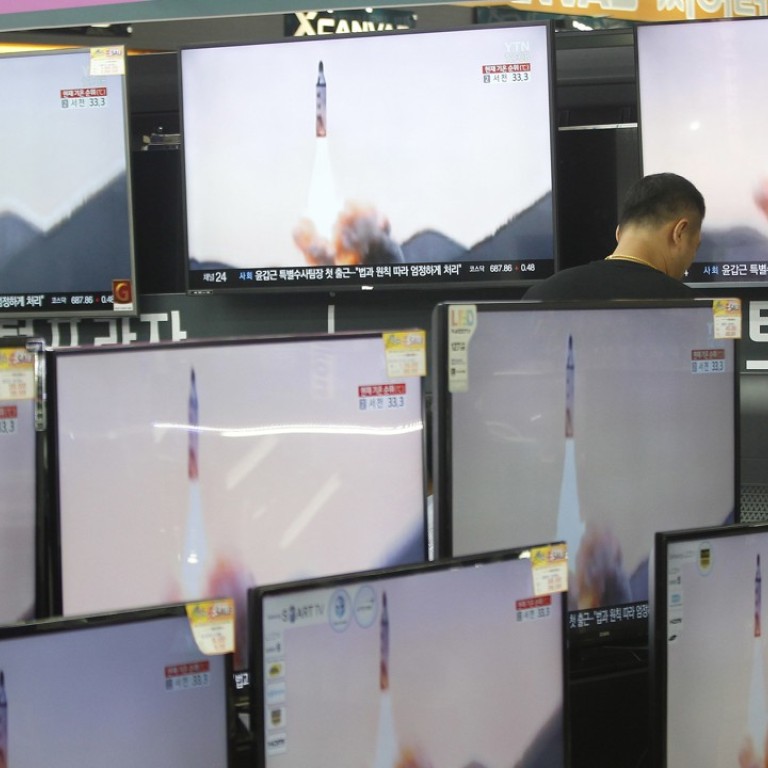
The US, China are more aligned on North Korea than previously known, Clinton’s speech shows
An outbreak of war or hostilities on the Korean peninsula will be the wild card catastrophe for markets and our lives in Asia.
Plenty of columnists have already been playing armchair generals, trying to assess the strategies and outcomes.
However, few have looked into what realpolitik is being played by the participants. Determining what is the genuine policy governing the relationship model with North Korea is more helpful in determining what constitutes a return to stability, versus a “clear and present danger.”
The thoughts of Hillary Clinton, while she was still US Secretary of State, offer us a glimpse into the American government’s long term Korean policy. Her cogent explanation of that policy was given for the first time when she gave a speech at Goldman Sachs’ 2013 IBD CEO Annual Conference in June 2013, headlined by her and Goldman’s chief executive Lloyd Blankfein.
That speech, among others, constitute emails to her campaign manager, John Podesta, which can be found on WikiLeaks. Clinton gave a speech and took questions in an environment where she appeared to be able to speak forthrightly and accurately. Her remarks were frank, rather astonishing and shone a revealing light on today’s panic stricken rhetoric.
“We don’t want a unified Korean peninsula, because if there were one, South Korea would be dominant for the obvious economic and political reasons,” Clinton said, according to the remarks published on Wikileaks.
This implies that a “system” of tacit understanding has been operating for decades to maintain a delicate balance of power. It’s adversarial insomuch as it’s useful for sustaining stability given the historical context.
“We don’t want the North Koreans to cause more trouble than the system can absorb,” she said. “So we’ve got a pretty good thing going with the previous North Korean leaders Kim Il-sung and Kim Jung-Il,” she said.
Despite all of the suffering inflicted by the two previous Kims on their own people, at least they weren’t a true international threat. Since their demise, the situation and operating model have fallen into disharmony.
American and Chinese policies on the Korean peninsula are actually more aligned than what the general public have been led to believe,
“And then along comes the new young leader, and he proceeds to insult the Chinese. He refuses to accept delegations coming from them. He engages in all kinds of public and private rhetoric, which seem to suggest he is preparing himself to stand against not only the South Koreans and the Japanese and the Americans, but also the Chinese,” Clinton said.
That China and America share the same desire is not widely known: keeping North and South Korea divided because unification is simply too risky, or would make South Korea even more economically powerful and militarily influential in the region.
Yet, they do not want North Korea acting out of control, crossing over these policy boundaries. They are willing to tolerate the internal excesses of North Korea as long as they stay inside their fence.
Clinton’s opinion on China’s viewpoint is equally realistic. “The biggest supporters of a provocative North Korea has been the People’s Liberation Army. Now we don’t care if you occasionally shoot off a missile. That upsets the Americans and causes them heartburn, but you can’t keep going down a path that is unpredictable,” she said.
She concluded by saying that China “wants to keep North Korea within their orbit. They want to keep it predictable in their view….You know, we all have told the Chinese if they continue to develop this missile programme and they get an ICBM that has the capacity to carry a small nuclear weapon on it, which is what they’re aiming to do, we cannot abide that.”
The only realistic option is negotiation, but for what purpose? This has been tried before and North Korea violated the agreements.
So we are left with the unpalatable dependence on mutually assured destruction. No one can stop North Korea from developing a nuclear missile. But you will have to be able to deter them from using it.
Peter Guy is a financial writer and a former international banker.

